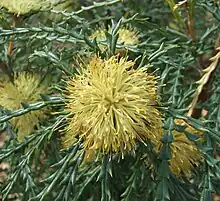| Many-headed dryandra | |
|---|---|
 | |
| Banksia polycephala in Cranbourne Botanic Gardens | |
| Scientific classification | |
| Kingdom: | Plantae |
| Clade: | Tracheophytes |
| Clade: | Angiosperms |
| Clade: | Eudicots |
| Order: | Proteales |
| Family: | Proteaceae |
| Genus: | Banksia |
| Subgenus: | Banksia subg. Banksia |
| Series: | Banksia ser. Dryandra |
| Species: | B. polycephala |
| Binomial name | |
| Banksia polycephala | |
| Synonyms[1] | |
| |
Banksia polycephala, commonly known as many-headed dryandra,[2] is a species of bushy shrub that is endemic to Western Australia. It has linear, pinnatisect leaves with up to twenty-five triangular lobes on each side, small, creamy yellow flowers in heads of up to seventy and egg-shaped follicles.
Description
Banksia polycephala is a bushy shrub that typically grows to a height of 4 m (13 ft) but does not form a lignotuber. The leaves are pinnatisect, 50–200 mm (2.0–7.9 in) long and 3–6 mm (0.12–0.24 in) wide on a petiole 1–2 mm (0.039–0.079 in) long. There are between ten and twenty-five sharply-pointed, triangular lobes on each side of the leaf lamina and one or two short teeth on the petiole. Between sixty and seventy cream-coloured flowers are borne in heads with lance-shaped involucral bracts up to 7 mm (0.28 in) long at the base of each head. The perianth is 13–15 mm (0.51–0.59 in) long and the pistil 16–19 mm (0.63–0.75 in) long. Flowering occurs from August to October, and the follicles are egg-shaped and 7–9 mm (0.28–0.35 in) long. Only up to three follicles form in each head.[2][3]
Taxonomy and naming
This species was first formally described in 1870 by George Bentham who gave it the name Dryandra polycephala and published the description in Flora Australiensis from specimens collected by James Drummond.[4][5] The specific epithet (polycephala) is derived from the ancient Greek words polys (πολύς), meaning "many" and kephalē (κεφαλή), meaning "head".[6]
In 2007 Austin Mast and Kevin Thiele transferred all dryandras to the genus Banksia and renamed this species Banksia polycephala.[7][8]
Distribution and habitat
The many-headed dryandra only occurs in an area between New Norcia and Bindoon where it grows in woodland with Eucalyptus wandoo.
Conservation status
This banksia is classified as "not threatened" by the Western Australian Government Department of Parks and Wildlife.[2]
References
- 1 2 "Banksia polycephala". Australian Plant Census. Retrieved 24 May 2020.
- 1 2 3 "Banksia polycephala". FloraBase. Western Australian Government Department of Biodiversity, Conservation and Attractions.
- ↑ George, Alex S. (1999). Flora of Australia (PDF). Vol. 17B. Canberra: Australian Biological Resources Study, Canberra. p. 278. Retrieved 24 May 2020.
- ↑ "Dryandra polycephala". APNI. Retrieved 24 May 2020.
- ↑ Bentham, George (1870). Flora Australiensis. London: Lovell Reeve & Co. p. 570. Retrieved 24 May 2020.
- ↑ Backer, C.A. (1936). Verklarend woordenboek der wetenschappelijke namen van de in Nederland en Nederlandsch-Indië in het wild groeiende en in tuinen en parken gekweekte varens en hoogere planten (Edition Nicoline van der Sijs).
- ↑ Mast, Austin R.; Thiele, Kevin (2007). "The transfer of Dryandra R.Br. to Banksia L.f. (Proteaceae)". Australian Systematic Botany. 20 (1): 63–71. doi:10.1071/SB06016.
- ↑ "Banksia polycephala". APNI. Retrieved 24 May 2020.
- Cavanagh, Tony and Margaret Pieroni (2006). The Dryandras. Melbourne: Australian Plants Society (SGAP Victoria); Perth: Wildflower Society of Western Australia. ISBN 1-876473-54-1.